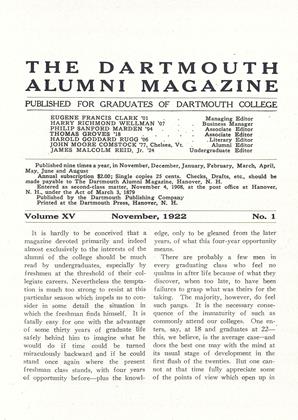More than 2500 alumni, undergraduates, and townspeople gathered in Hanover to celebrate the 27th annual observance of Dartmouth Night held in the tent on the college campus October 13, pledging anew allegiance and loyalty to the College in a demonstration more largely attended and more enthusiastic than any similar one held in Hanover since the Great War.
The customary torchlight procession headed by the College Band and Palaeopitus repeated the time honored march around the campus, up College Street to the home of the President and thence byway of Maynard Street and Main Street to the tent, on a raw and gusty night which, though causing the myriad torches to waver and to sputter frantically, failed to diminish in the least the ardor of their bearers.
Rousing cheers for President Tucker, President Hopkins, ' Ned" Tuck, and the College, and the singing of a number of Dartmouth songs by the Glee Club opened the exercises in the tent at which President Hopkins presided.
Following the usual reading of telegrams from alumni associations throughout the country, President Hopkins introduced the speakers of the evening, Professor E. E. Day '05 recently elected Professor of Economics and placed in charge of the organization of the work of the Economics Department of the University of Michigan; Major E. D. Reddington '61, of Evanston, Ill., a classmate of President Tucker, and United States Senator George H. Moses '90.
Professor Day; an instructor in Economics at Dartmouth from 1907 to 1910 and until his election at Michigan, instructor and Professor of Economics a Harvard, after welcoming the incoming freshmen to the College and recalling the many changes which have taken place in the College within the past decade urged the men of 1926 to strong endeavor to make themselves worthy of the heritage that as Dartmouth men is theirs.
Major Reddington, a veteran of the Civil War, a servant of the College, as a trustee from 1895 to 1905, and an alumnus, who has been for many years enthusiastically interested in the affairs of the College, welcomed the freshmen on behalf of the graddates of an earlier generation, expressing the confidence with which those graduates looked to the new men to carry forward the works of the College and to maintain its traditions.
Senator Moses, one of the most distinguished of Dartmouth graduates in public life, was the last speaker of the evening program, calling to the minds of the undergraduates the problems of the nation which, as citizens, they will be called upon to face with honesty and intensity and pleading that as graduates of the College they might carry into the work of the world the enthusiasm and energy of the campus.
The singing of Hovey's "Men of Dartmouth" concluded one of the most successful Dartmouth Nights of recent years.
 View Full Issue
View Full Issue
More From This Issue
-
 Article
ArticlePRESIDENT'S ADDRESS EVOKES NATION-WIDE COMMENT
November 1922 -
 Article
ArticleAN ARISTOCRACY OF BRAINS
November 1922 By ERNEST MARTIN HOPKINS -
 Article
ArticleIt is hardly to be conceived that a magazine devoted primarily
November 1922 -
 Class Notes
Class NotesCLASS OF 1911
November 1922 By Nathaniel G. Burleigh -
 Class Notes
Class NotesCLASS OF 1911
November 1922 By Nathaniel G. Burleigh -
 Article
ArticleTHE CLASS OF 1926
November 1922 By E. GORDON BILL
Article
-
 Article
ArticleFRESHMAN SONS OF DARTMOUTH FATHERS
January, 1923 -
 Article
ArticleA New Front on Robinson’s Back
JANUARY 1997 -
 Article
ArticleOther Sports
June 1955 By Cliff Jordan '45 -
 Article
ArticleSkiing
FEBRUARY 1959 By CLIFF JORDAN '45 -
 Article
ArticleMedical School
NOVEMBER 1962 By HARRY W. SAVAGE M'27 -
 Article
ArticleThe Undergraduate and His College
November 1928 By President Hopkins


